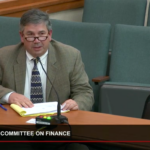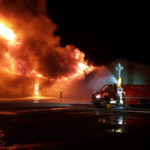The 88th Texas Legislature concluded May 29, but lawmakers almost immediately began the first in what likely will be a series of special sessions called by Gov. Greg Abbott.
“It’s too early to take any victory laps,” said John Litzler, public policy director for Texas Baptists’ Christian Life Commission. “But overall, we feel good about the session.”
Multiple bills still await the governor’s signature, and a veto of some could be possible, he noted. More likely, some legislation—particularly concerning public education and private school vouchers—could be the subject of a later special session.
The first special session is devoted specifically to property tax relief and border security. However, Abbott had indicated he will call additional special sessions. At the beginning of the regular session, he made “school choice” legislation—specifically a voucher-style education savings account program—an “emergency item.”
Public education
During the regular legislative session, the Texas House of Representatives held the line against private school vouchers. However, pay raises for public school teachers became a casualty of an ill-fated attempt to pass educational savings accounts.
Litzler said he remains “cautiously optimistic” lawmakers will find a way to fulfill their constitutional duty to provide funding for public education—including pay raises for schoolteachers—separate from any problematic education savings account proposal.
Charles Foster Johnson, founding executive director of Pastors for Texas Children, likewise expressed faith in rural Republicans and urban Democrats who remain committed to public education—and expressed deep disappointment in the governor.
At the grassroots, Texans understand “vouchers are fundamentally unjust and inequitable,” Johnson said.
“It is wrong for public tax dollars to be diverted to subsidize the private education of affluent children. To pay for religious education is an especially egregious violation of both the public trust and of God’s moral law of religious freedom,” he said.
Sign up for our weekly edition and get all our headlines in your inbox on Thursdays
Abbott has “tied up the entire legislature this session” to advance a national political agenda that lacks support at the local level in Texas, Johnson asserted.
“Sadly, his stated intention is to continue calling special legislative sessions until he bullies the House into submission,” he said. “There is only one way to death with a bully—a firm, patient, courageous confrontation. Precisely what our morally oak-strong caucus of pro-public education rural Republicans and urban Democratic House members can provide.”
In spite of some setbacks in public education, Litzler pointed to apparent victories in the areas of religious liberty, pro-life legislation and opposition to predatory financial practices.
Religious liberty
The CLC supported three bills related to religious holidays that passed both the House and Senate and now are on the governor’s desk.
HB 608 allows the sale of fireworks before and during Diwali, a traditional part of the “festival of lights” observed by many Hindus, Jains and Sikhs from India. HB 1212 allows a parent to verify an excused absence for a student to observe a religious holy day. HB 1883 prohibits testing on religious holy days.
The House successfully killed two Senate-approved bills opposed by organizations that support separation of church and state. SB 1396 would have created a period of prayer and Bible reading—later amended to allow for the reading of any sacred texts—in public schools.
SB 1515 would have mandated the prominent display of a Protestant version of the Ten Commandments in every public school classroom. The bill prescribed the exact wording of the Ten Commandments—an abbreviated version of Exodus 20:2-17 from the King James Version of the Bible. Jews, Catholics and Protestants number the commandments differently, and their wording varies.
“Stopping Texas from forcing public school classrooms to display the Ten Commandments is a victory for religious freedom,” Amanda Tyler, executive director of the Baptist Joint Committee for Religious Liberty, tweeted on May 24.
With mixed results, the CLC worked to try to improve SB 763, a bill with strong Senate support that allows school districts to employ chaplains.
As originally introduced, the bill would have permitted districts to hire chaplains in place of trained and certified school counselors, but that language was changed to make it clear the employment of chaplains was in addition to licensed school counselors.
The CLC also supported a House amendment defining chaplains as individuals endorsed by an endorsing body recognized by the U.S. Department of Defense, the Federal Bureau of Prisons or the Texas Department of Criminal Justice. The House also amended the bill to prohibit registered sex offenders from serving as chaplains and called for background checks.
However, the Senate ultimately stripped the amendment requiring endorsements by recognized bodies—along with the other amendments—before passing the bill and sending it to the governor.
Litzler noted both the Ten Commandments bill and the legislation creating a designated time of prayer and the reading of religious texts had the strong support of Lt. Gov. Dan Patrick, and they likely could return in a special session focused on public education.
Pro-life legislation
HB 12, which extends Medicaid for eligible women from two months to 12 months after pregnancy, passed by the House and Senate and was sent to the governor and awaits his approval.
SB 24 codifies what previously was identified in the state budget as “Alternatives to Abortion,” renaming it the “Thriving Texas Family Program” within the Department of Health and Human services. It stipulates the program provides a continuum of care, both prenatal and postpartum. The bill passed both the House and Senate and is on the governor’s desk, awaiting his signature.
SB 24 provides paid parental leave for state employees upon the birth or adoption of a child, SB 2158 creates a pilot program for adult high school education in prison, and HB 1743 allows inmates to apply for SNAP benefits early so they are available immediately upon release from prison. All three bills passed in the legislature and are on the governor’s desk.
SB 838, which requires panic alert devices in all public school and charter school classrooms, passed in the legislature and has been signed into law by Gov. Abbott.
HB 300, which would have provided a sales tax exemption for diapers, maternity clothes and certain feminine hygiene products, passed the House but not the Senate.
HB 381 and HB 7272, which would have barred capital punishment for individuals with severe intellectual disability and for individuals with severe mental illness, likewise passed the House but not the Senate.
Predatory financial practices
The Texas Senate stood firm in opposition to major expansion of legalized gambling in Texas.
HB 1942 and HJR 102 would have allowed online sports wagering. The measures passed the House but not the Senate.
SB 1820, which prohibits the sale of lottery tickets by phone, passed the Senate but not the House, but the provision was successfully attached as a rider to the state budget.
HB 2842 and HJR 155, which would have called for a constitutional amendment to allow casinos in Texas, died by procedural action.
HB 1759 would allow professional sports teams to sell charitable raffle tickets online. The bill passed, but it was amended to limit its scope. Originally, it would have permitted individuals within one mile of a professional sports venue to purchase raffle tickets by phone. The bill was amended to restrict the sale of cash raffle tickets to individuals present at a sporting event.
HB 2127 places significant limits on any city and county regulations that go further than state law. However, it exempts the existing local restrictions on payday lending adopted by 49 Texas cities. The bill passed the legislature and awaits the governor’s signature.
Other legislative matters
Litzler also noted an item outside the CLC legislative agenda he was glad to see pass. HB 53 expands the exemption from emergency vehicle registration to include nonprofit disaster relief organizations, such as Texas Baptist Men. After being approved by the legislature, the bill is now on the governor’s desk.
As lawmakers deal with the called special session on property tax relief and border security, as well as future items in additional special sessions, the Texas Senate faces an additional task—conducting a historic impeachment trial this summer.
The state House of Representatives voted 121-23 to impeach Attorney General Ken Paxton after a House committee filed 20 articles of impeachment against him including bribery, obstruction of justice and dereliction of duty.














We seek to connect God’s story and God’s people around the world. To learn more about God’s story, click here.
Send comments and feedback to Eric Black, our editor. For comments to be published, please specify “letter to the editor.” Maximum length for publication is 300 words.